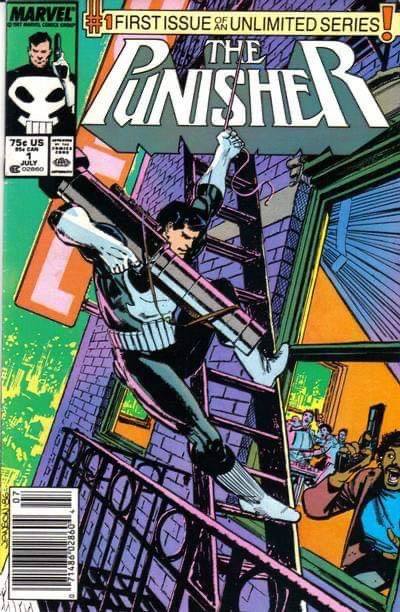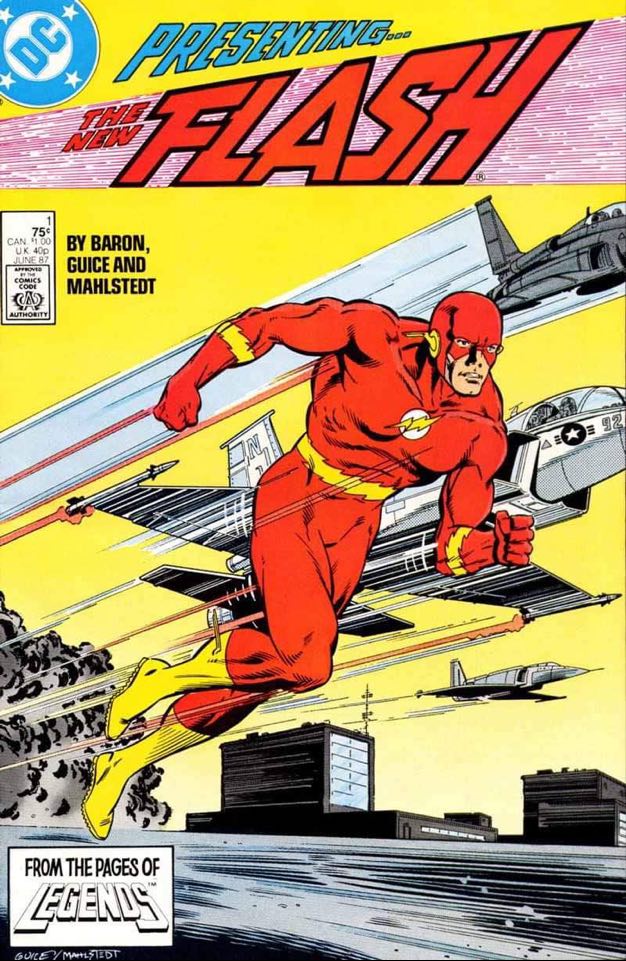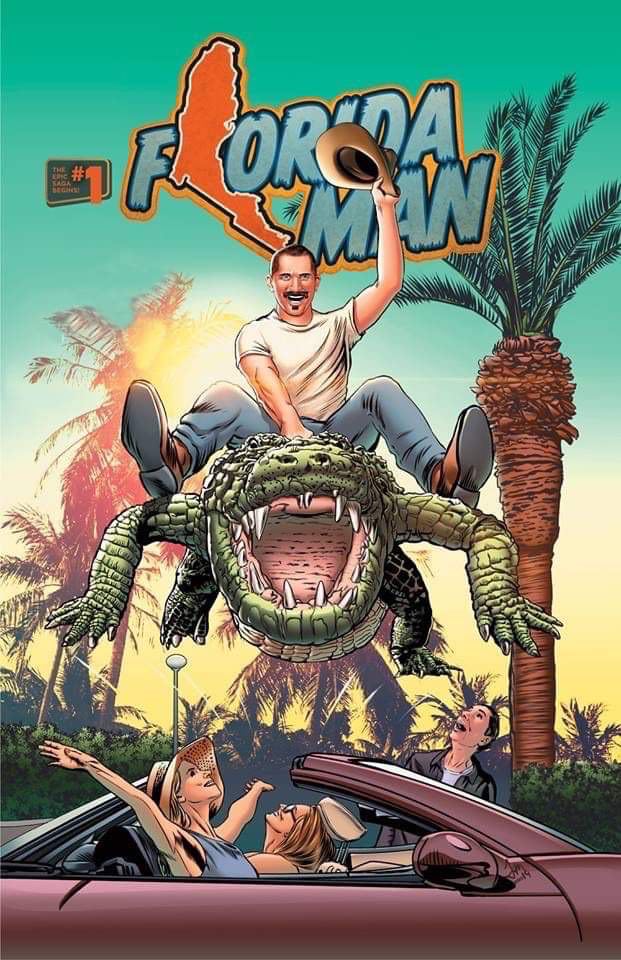
Mike Baron is a legend in the world of comic books. Not only did he write the original ongoing Punisher series, which influenced so many future writers, and introduced many characters and mythos that remain true to the character to this day. Not only did he introduce an entire generation to Wally West as The Flash, but he is also the two-time Eisner Award winning creator, along with artist Steve Rude, of Nexus, one of the longest running creator owned series of all time.
I had the chance to talk to Mike about his career in comics including his work at Marvel and DC, and his two most popular creations, Nexus and The Badger. We also talked about his more recent work as a novelist, focusing on his hilarious satirical Florida Man series, and the novelization of his comics work.
Enjoy my interview with Mike Baron!
Fantasy/Sci-Fi Focus (FSF): Hey Mike, how’s it going? How has this last year and a half of global insanity been treating you?
Mike Baron (MB): Writers have been preparing for this pandemic their whole lives. I do what I always do. I sit in my room and type. I also made a point of going out in the sunshine and enjoying myself.
FSF: I hear you. While I’m sympathetic to those that have suffered greatly, it hasn’t changed my life yet other than getting more time with my family.
So you’ve had a long and diverse writing career which began in comics, and has transitioned into novels. I’d like to start at the beginning. When did you know you wanted to be a writer professionally, and what was the first work you produced that made you realize you would be able to make a career out of it?

MB: My writing career began in high school when I started writing about TV shows for the school paper. When I graduated college, I heard there were weekly newspapers in Boston willing to hire anyone who could write. I moved to Boston and crashed with some pals while I made the rounds.
My first job in Boston was smoking marijuana for the government . I answered an ad in the Boston Phoenix for volunteers for a month-long study. A dozen of us lived in a hospital ward, smoked dope all day, and took a battery of tests…It was just like college.
After I got out, I wrote that up, sold it to the Boston Phoenix, and thus, my career began. I became the music editor. It was my job to go out night after night, listen to the musicians, interview them, write reviews. I saw many of my jazz idols, including Mingus, Les McCann, Jaki Byard, Jaco Pastorius, Randy Weston… Also many pop musicians. I interviewed Eric Carmen. He was sick as a dog.
I had been trying to write novels since college. I would just sit down and wing it. This led to my insight that every would-be writer has a million words of shit clogging up his system, and you have to get that out before you get to the good stuff. It took me 30 years to learn how to write a novel, but that’s because I’m a slow learner.
I moved back to Madison in ’77 and took a job at an insurance company. One day I got a phone call from an editor who told me there was some guy at his office trying to sell his drawings, and he drew just like me. That was Steve Rude. I met Steve on the steps of the Student Union, he opened his portfolio, and I gave up drawing. We were in the right place at the right time. Capital City Distribution, the 2nd largest comic distributor in the world, wanted to get into publishing. I brainstormed the first 12 pages of Nexus, drew them out by hand, gave them to him. Dude (Steve) drew, inked, lettered, and we showed it to the boys at Capital and we were off and running.
FSF: Now you were only on Capital for a few issues, and then the majority of the series came out on First. What happened there?
MB: Capital realized they had bitten off more than they could chew and shopped us around.
FSF: Nexus is one of those series that gets mentioned in very high regard when long running creator owned series are discussed. What was your intention when writing the series? Did you know you were on to something special. Why do you think Nexus has endured and continues to resonate with so many comic readers?
MB: As always, the first goal is to entertain. Capital wanted a superhero. I asked myself what made for a compelling character. What if he killed someone every time he showed up? This was compelling, but it’s hardly a new revelation. It’s why there are so many cop, doctor, and lawyer shows. Life and death. The stuff of drama. In order to make Nexus sympathetic, he would be an executioner of mass murderers, going after otherwise untouchable war criminals. Lord knows there are plenty, even now.
We have a term for it. Crimes against humanity. One of Nexus’ recurring themes is the difficulty we might have conversing with an alien intelligence. Thus, Nexus only goes after humans. The kicker was, he was a reluctant executioner, the victim of an insane alien who had chosen Horatio Hellpop as the conscience of his race. An insane alien conducting a social experiment according to its own mores and rules. This was the Merk.

FSF: Now I’m not going to lie, for many years before we met, the name Mike Baron, was synonymous with begging my parents for an UZI watergun to take to overnight camp so I could run around and shoot the terrorists! (The dudes in the next cabin over) I don’t think there was a bigger Punisher fan than me age 10-12, and that was because of what you brought to the character, so I want to know how that came about. How did you end up at Marvel writing one of the great classic runs of all time?
MB: Carl Potts asked me to write Punisher because he liked Badger.
FSF: Now I’ll come back to Badger shortly, but staying on The Punisher, what did you love most about the character? What do you think you brought to Frank Castle that made him so enduring?
MB: I had a few insights. Frank came from Sicilian stock. Frank was a guilt-ridden Catholic. He had a strong moral core. He felt he was in a fight with the forces of darkness. He was a vigilante, but he was also a flesh and blood human being with no special powers.
FSF: Many writers include elements of themselves into their characters. Some of the more well known avatars in comics, include King Mob, in Morrison’s The Invisibles, and Dave Sim including himself as a character in an issue of Cerebus. Is this a tactic you employ in your work, and if so where might we find some examples?
MB: Every writer brings his personal experiences and world view into his writing, but I don’t insert myself into the narrative. Dude drew us into a couple issues of Nexus. That’s about it. Josh Pratt is my crack at creating a Travis McGee like character, after my main inspiration, John D. MacDonald. Gary Duba is a composite of the type of Floridian you read about in the news, minus the more scurrilous or bizarre elements. In many ways, Gary is the most admirable character in the book. He has a bad temper, makes poor decisions, likes to get high, drink, always looking for a get rich quick scheme, but he’ll give you the shirt off his back. Badger is more a pure id thing. Badger says things I wish I could say. He has no filter. But writing a proper multiple personality rules out inserting myself into the narrative. It’s the writer’s job to imagine every point of view. Otherwise, Shakespeare could not have written Othello.
FSF: So let’s talk a bit about Badger. I’m a huge fan of the book, which is actually not only a unique take on super heroes but incredibly funny. Who is the Badger for the uninitiated?
MB: Badger is a multiple personality only one of whom is a costumed crime fighter. Inspired by Daniel Keyes’ The Minds of Billy Milligan, Badger is an accomplished martial artist who can see a technique once and replicate it. He has an unusual rapport with animals, almost as if they understand one another. As MPD is the result of horrendous childhood experiences, there is a dark side of his personalities which we examined closely in the Dark Horse series, The Shattered Mirror, illustrated by Jill Thompson. The majority of his stories are funny. They are designed to entertain. That’s rule number one. It is the writer’s job to entertain. Never lose sight of that.

FSF: I’m going to shift gears into your more recent work shortly but before I do I wanted to bring up your run on Flash at DC which was consequently the first Flash comics I read, and the run that made myself and so many others claim Wally West as “our Flash”. How did you end up writing Wally’s first stand as the DCU’s Flash? With such an amazing run, why did it end so soon?
MB: Mike Gold asked me to write the Flash. I had one big insight. Flash burned so much energy, he was constantly eating! Honestly, I didn’t know where to take the character next and that’s why I quit the book. That wouldn’t happen today.
FSF: So fast forward a number of years, and despite still writing comics, you’ve also become an incredibly prolific novelist. When did you decide you wanted to switch to prose novels? What was it like at first having always worked in comics, and what was the impetus behind your decision. Let’s begin with your original non-comic based properties like Helmethead, Biker etc.
MB: Incredibly prolific? My friend Pete Brandvold writes six novels a year! Kevin J. Anderson published a half a million words a year! Honestly, I’m surprised anything gets done around here. I went through a very difficult period where I couldn’t get any work, had a sick wife, took any job I could to make ends meet. I unloaded automobile bumpers. I was a schoolyard monitor. Then one day I decided to take another crack at it. I don’t know what came first, Helmet Head or Banshees. Helmet Head I think. That was me clearing my throat. I had a great idea. Nazi biker zombies. But Banshees was something else. A satanic rock band that comes back from the dead. I was sitting right here writing it one day and I realized I knew where I was going. That was the tipping point for me. I understood the novel! I knew what I had to do. Ever since then, I approach each fresh book with joy and excitement because I know what I have to do.
FSF: So let’s get a bit deeper into Florida Man. Some people understand the odd mythos of the state of Florida, and authors like Carl Hiaasen and Tim Dorsey have been writing crazy satirical Florida stories for years, but for those unaware, what inspired you to write the Florida Man series of novels and associated graphic novel? Who is Florida Man, and why do we all need to read about him?
MB: Every time I went online there was another Florida Man story. At some point I realized I had to write about this guy. The stories were so crazy, they begged for a fictional treatment. I originally conceived it as a comic series. i wrote five scripts and realized I had the outline for a novel. So I wrote the novel and queried my publisher Wolfpack, and they went for it. FM’s main purpose is to make you laugh. It works better if Gary is sympathetic, and as I stated above, in many ways, Gary is the most admirable character in the book. In the pantheon of humor, absurdity is at the top. I try to put Gary in the most absurd, embarrassing situations possible. Same for his friends. For those unfamiliar with the news stories, go to floridman.com I also draw inspiration from ambulance chasers (Habib Rodriguez,) invasive species, with whom Gary is constantly struggling, drug culture, and ex-royals. The Royal Ducats play a prominent part in Catfish Calling. The Royal Ducats are based on a certain royal couple that’s on the outs with the Queen. There are no end to Florida Man stories, and there will be no end to this series. For those interested in the graphic novel, go to floridamancomics.com

FSF: And it is absolutely hysterical. I’m glad there’s no end it sight. You’ve also recently begun to novelize your original comic book characters Nexus and The Badger. Why did you decide to do this and what can you tell us about the novels that separates them from the comics they were based on?
MB: A novel has room for nuance, emotions, and tributaries that won’t fit in a comic. It’s a different experience. A novel takes more time to read, and should give you a lot more to think about. The Badger novel is a huge leap forward in terms of Badger’s relationships, and future. There are permanent changes which make the story more compelling. In fact, I think it’s the best Badger story ever and I hope to turn it into a comic book series. I adapt my comic scripts into novels, and my novels into comics. Likewise, the Nexus novels permit me to create vast new worlds, and an opportunity to reveal what the characters think. Of course, it must be entertaining. That’s rule number one. Writing Nexus as straight prose is liberating. I use it to illuminate heretofore unsuspected story aspects, and examine my recurring theme, that human intelligence may never be able to understand certain alien intelligences.
FSF: So what takes up most of your time these days when you’re not engaged in creative work?
MB: Bike rides, karate, trying to keep the house clean, keeping the dogs entertained, going out to hear music.
FSF: Which reminds me, you used to be a music journalist, and have gotten to interview some major artists if I’m correct.
MB: Yup. I’ve interviewed Jaco Pastorius, Les McCann, James Brown, Eric Carmen, Rick Derringer, McCoy Tyner, Richard Davis, Clyde Stubblefield…the list goes on.

FSF: Awesome! Now I wanted to get into your influences because I suspect you are an influence to many in the comics field. Who are some of the writers that have always influenced you? And who are some of your contemporaries whose work you would recommend?
MB: John D. MacDonald, Philip Jose Farmer, Carl Barks.
FSF: I’m unfamiliar with Barks’ work but of course familiar with the character. What is it about his work on Uncle Scrooge that you love so much, and has inspired your own writing. Many may be surprised about this particular influence.
MB: Barks was a master story-teller. You should check out some of his work. The stories are entertaining. There are no wasted panels. You never get the sense he’s just marking time, like you do with so many modern comics. And his art style was unique and capable of awe and wonder. Look at that bubble car in the background.
FSF: So I wanted to mention something and I thought it would be cool if you shed some light on it. You’ve unfortunately been victim over the years to some in my opinion highly misinformed and unfortunate slander by certain elements in the comics industry, and in doing my own research and also getting to know you I feel like this is highly inaccurate, and has done you a great injustice. What would you like to say to set the record straight, and falsify some of the uniformed misconceptions some people might have about you?
MB: Haters gonna hate. No amount of explanation will mollify some people. Going into specifics will only invite more vitriol. I prefer my work to speak for itself.

FSF: Totally fair. So let’s give the lovers something to get excited about. It seems that you have a big year of releases, both in comics and novels. Why don’t you take this time to tell us about as much of it as you can, including when we can expect it!
MB: I have a new comic called Buddy McGill shipping in October. At the end of July we will launch our crowd funder for Thin Blue Line. Following that will be Florida Man Graphic Novel 2, Hogzilla.
The Kelsey Shannon illustrated Nexus: triplets, is at the printer now. This is a three issue series from Splatto which Dark Horse will likely release as a Trade Paperback. Monster Hunt 2: Let’s Get Kraken, featuring Nexus, Lonestar, and Bigfoot Bill is being colored right now. Richard Bonk is over the halfway point with Nexus: Nefarious, which Dark Horse will release next year. I’m also working on some projects which I can’t talk about. I’m writing The Saints for Allegiance Arts. That will start appearing in Walmart toward the end of the year. I’m working on second Nexus novel, a military science fiction novel with Major Diggs Brown, and the ninth Biker novel, Khan, which is about an escaped tiger.

FSF: Awesome. I can’t wait to read it all.
I like to end all of my interviews with this question. What one piece of advice can you offer to new and aspiring authors?
MB: Always take a hat.
FSF: Mike it’s been a pleasure. Thanks for taking the time!
MB: Thanks, Mike!
